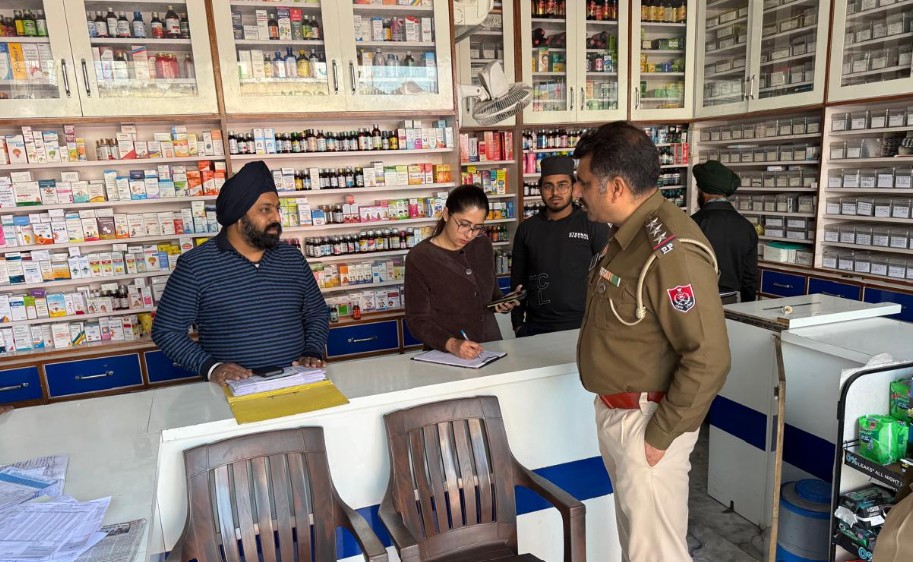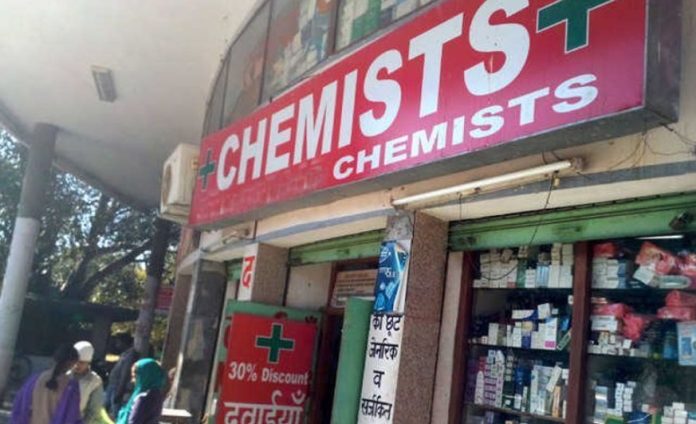The Punjab Police recently conducted a large-scale operation, raiding a total of 524 locations across the state, including 164 pharmaceutical shops. This extensive crackdown was part of an ongoing effort to curb the illegal sale of drugs and ensure that pharmaceutical establishments comply with legal regulations. The operation was launched in response to growing concerns over the misuse of prescription medicines and their role in drug abuse, which has been a major issue in Punjab for years. Authorities have been under pressure to take decisive action against illegal drug networks, and this series of raids represents a significant step in that direction.
The raids were carried out simultaneously across multiple districts in Punjab, with a well-coordinated effort involving various law enforcement units. Senior officials had been closely monitoring suspicious activities linked to pharmaceutical stores, warehouses, and other locations suspected of being involved in the illegal drug trade. The Punjab Police received intelligence reports that certain medical shops and suppliers were either selling drugs without prescriptions or providing pharmaceutical substances that were being misused for addiction purposes. Acting on these reports, the authorities planned a comprehensive operation to crack down on such activities.
During the raids, law enforcement teams inspected various pharmaceutical shops to check for compliance with regulations regarding the sale of prescription drugs. Many stores were found to be operating without proper documentation, while others had been allegedly selling controlled substances without following the necessary protocols. A significant number of pharmaceutical stores were also found to be stocking medicines that require strict regulations, such as opioids and sedatives, without maintaining proper records of their sales. These findings raised concerns about the extent to which pharmaceutical shops may be contributing to the larger drug abuse problem in the state.
In addition to pharmaceutical shops, the police also targeted other locations suspected of being involved in the illegal drug trade. Warehouses, storage units, and private properties were raided to uncover any hidden stockpiles of illicit drugs. Some locations were discovered to have large quantities of unaccounted-for pharmaceutical drugs, indicating a potential supply chain feeding into illegal markets. The police seized a variety of substances, including painkillers, sedatives, and other prescription drugs that are often misused by addicts. Several individuals were taken into custody for further questioning regarding their involvement in these activities.

One of the primary concerns that led to these raids was the increasing number of cases involving the misuse of pharmaceutical drugs, particularly among young people. Authorities have been grappling with the rising trend of addiction to prescription medicines, which are often perceived as a safer alternative to illegal narcotics but can be equally dangerous when abused. The misuse of opioids and sedatives has been a growing issue, with many addicts obtaining these substances through medical stores that fail to enforce prescription regulations. The Punjab Police have been working to dismantle the networks that facilitate this illegal trade, and this latest operation was a part of that larger strategy.
The crackdown also highlighted the role of certain pharmaceutical shop owners and suppliers in enabling drug abuse. While some stores were found to be unknowingly violating regulations due to a lack of awareness, others appeared to be deliberately engaging in illegal sales. The authorities have issued warnings to medical shop owners about the consequences of failing to comply with the law. Those found guilty of violating regulations may face legal action, including the cancellation of their business licenses and criminal charges. The police have also urged the public to report any suspicious activities related to the sale of pharmaceutical drugs, emphasizing the importance of community involvement in tackling the drug problem.
In addition to targeting illegal pharmaceutical sales, the Punjab Police have been working closely with health authorities to strengthen regulations governing the distribution of prescription medicines. Efforts are being made to ensure that only licensed medical professionals have access to controlled substances and that strict record-keeping practices are enforced. The government is also considering implementing stricter policies for pharmaceutical shops, including regular inspections and more stringent penalties for violations. These measures are aimed at closing loopholes that allow prescription drugs to be diverted into the hands of addicts and drug dealers.
The reaction to the raids has been mixed. Many people in Punjab have welcomed the police action, viewing it as a necessary step to combat the drug crisis that has plagued the state for years. Families affected by drug addiction have expressed hope that stricter enforcement will help reduce the availability of harmful substances. On the other hand, some pharmaceutical shop owners and industry representatives have raised concerns about the raids, arguing that legitimate businesses should not be unfairly targeted. They have called for clearer guidelines and better communication between law enforcement and the medical community to ensure that innocent shop owners are not caught up in the crackdown.
The Punjab government has reiterated its commitment to tackling the drug problem and has promised continued action against those involved in illegal activities. Officials have stated that this is just one phase of a larger effort to clean up the state and restore public confidence in law enforcement. The police are expected to conduct further inspections in the coming months, with an emphasis on monitoring the sale of prescription drugs and preventing their misuse. Authorities have also pledged to work on rehabilitation efforts, recognizing that enforcement alone is not enough to address the root causes of drug addiction.
This large-scale operation is part of a broader anti-drug campaign that has been ongoing in Punjab for several years. The state has struggled with high levels of drug addiction, and various governments have implemented policies to address the crisis. While progress has been made in some areas, the challenge remains significant, and authorities continue to seek new ways to combat the problem. Law enforcement agencies have been working in coordination with drug control authorities, health officials, and community organizations to develop a multi-faceted approach that includes prevention, treatment, and enforcement.
One of the key aspects of tackling the drug crisis is ensuring that young people are educated about the dangers of drug abuse. The Punjab government has been working on awareness campaigns aimed at schools, colleges, and communities to inform people about the risks associated with drug addiction. Efforts are also being made to strengthen rehabilitation centers and provide better support for those struggling with addiction. The goal is to not only cut off the supply of illegal drugs but also to reduce the demand through education and treatment programs.
The latest raids signal a strong commitment from the Punjab Police to tackling the drug menace at multiple levels. By targeting pharmaceutical shops and suppliers, authorities are addressing one of the key sources of drug availability in the state. The operation also serves as a warning to those engaged in illegal activities that law enforcement is actively monitoring and ready to take action. While challenges remain, such initiatives are a step toward creating a safer and healthier environment for the people of Punjab.
Moving forward, the success of such crackdowns will depend on continued vigilance, coordination between different agencies, and the implementation of long-term solutions. Strengthening laws, enhancing oversight of pharmaceutical sales, and investing in rehabilitation programs are all essential components of a comprehensive strategy to combat drug abuse. The people of Punjab are watching closely to see how these efforts unfold and whether they lead to lasting change in the fight against drug addiction.
In conclusion, the Punjab Police’s raids on 524 sites, including 164 pharmaceutical shops, mark a significant effort in the state’s fight against drug abuse. The operation uncovered illegal drug sales, highlighted regulatory lapses, and sent a strong message to those involved in unlawful activities. While the crackdown has been praised by many, it has also raised questions about how the enforcement is being carried out and what steps will be taken to ensure fairness in the process. As Punjab continues its battle against drug addiction, the authorities must strike a balance between strict enforcement and support for rehabilitation efforts, ensuring a long-term solution to one of the state’s most pressing challenges.


